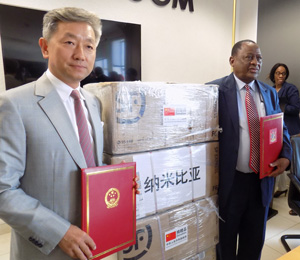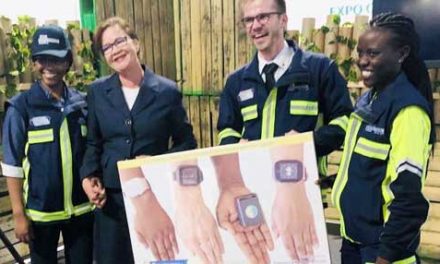
More pledges to support infant and child immunisation in developing countries
BERLIN, 26 January – Gavi, the Vaccine Alliance this week welcomed new commitments from a number of private sector partners towards its mission to immunise children in developing countries.
The commitments – made by vaccine manufacturers and other private sector companies – will contribute to Gavi’s goal of immunizing 300 million children in the world’s poorest countries between 2016 and 2020, leading to five to six million lives being saved.
The announcements come on the eve of the pledging sessions of the Gavi Replenishment Conference.
The conference, being held in Berlin under the patronage of German Chancellor Angela Merkel, aims to secure funding to ensure Gavi can reach its ambitious targets. “It is encouraging to see vaccine manufacturers increasingly recognising the importance of sustainable vaccine markets for developing countries,” said Gavi CEO Dr Seth Berkley.
“The commitments made [today] will help us make more vaccine doses available at a lower cost and will support countries as they move towards financing and sustaining their own immunisation programmes.
This will lead to more children being protected and more deaths being averted.”
The following commitments were announced: Biological E – offering a five-year price commitment to Gavi graduated countries for its pentavalent vaccine; GSK – extended it price freeze commitment so that developing countries that graduate from Gavi support will be able to continue to purchase vaccines against pneumonia, diarrhoea and cervical cancer at significantly discounted Gavi prices for a decade after graduation.
GSK also reaffirmed that if the company identifies new manufacturing efficiencies that reduce the costs of producing these vaccines, it will pass those savings on to Gavi and its donors; Janssen – Reaffirmed its pledge of making its pentavalent vaccine available at UNICEF prices to Gavi graduated countries over the next five years.
Janssen also announced the launch of its pentavalent vaccine in cPAD, a compact Prefilled Auto-Disable injection system which helps improve injection safety; Panacea Biotech – extends its pledge, first made in June 2011, to support all Gavi graduated countries by offering a five-year price freeze on all vaccination programmes started with Gavi support.
The price freeze commences from the first calendar year during which a country stops receiving Gavi support; Pfizer – agreed to reduce the price per dose for its pneumococcal vaccine, from US$3.30 per dose to US$3.10 per dose for the new four-dose vial presentation which is expected to be introduced under the Advance Market Commitment programme in 2016.
This new lower price will be extended to all Gavi-eligible and graduated countries until the end of 2025.
Sanofi Pasteur – committed to expand the production of yellow fever vaccine to address chronic shortages, and promised to offer Gavi-level pricing for Gavi graduated countries until the end of 2018; Serum Institute of India – reduced its price for their pentavalent vaccines supplied to Gavi that is valued at approximately US$50 million dollars over the next two years.
Additionally, Merck and NewLink Genetics committed to provide their investigational Ebola (rVSV-EBOV) vaccine to Gavi-eligible countries at the lowest possible access price.
In a statement, the International Federation of Pharmaceutical Manufacturers and & Associations (IFPMA) said: “vaccines are recognised as one of the most cost-effective health interventions, with potential for substantive, positive impact on health, productivity, and well-being across the globe. IFPMA member companies are proud of their role to help support strong immunization programs through ensuring sustainable research and development, manufacturing, and availability of high-quality vaccines.”
Sustainable vaccine markets for developing countries are a key part of Gavi’s mission.
Before Gavi was formed in 2000 there was little incentive for manufacturers to offer vaccines at affordable, low prices to developing countries. Gavi’s purchasing power, which covers around 60% of yearly global birth cohort, means that it is able to provide a stable, sustainable market when negotiating low prices for vaccines.












































